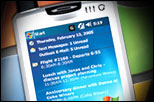Are you doomed to a life of desk-bound misery?

Although the number of mobile workers is expected to reach one billion by 2011, a significant proportion of employees will always be confined to the office -- where they will be miserable.

Earlier this week, analyst firm IDC released a report saying pressure was rising on companies to provide employees with flexible working conditions through mobile technologies. IDC predicts that almost 75 percent of the American workforce will be mobile by 2011.
IDC estimated that 40 percent of Australian businesses have already adopted a wireless solution, and that the recent price cuts by 3 and Vodafone in mobile broadband should ensure more companies issue mobile devices to workers, enabling them to work off-site.
However, not all workers will benefit from mobile work practices, according to Dr Kevin McIsaac from analyst firm IBRS. "It's no longer the technology that limits where people work from, it's the business practice," he said. In some businesses, he continued "you've got to be in the office so people can see your face."
Some jobs work well in a mobile sense because they have a specific output, he said: "Either you met your outcomes or you didn't." Others jobs where employees need to "be there" are more difficult to make mobile.
There are many different ways to go mobile, according to McIsaac. The first is as simple as using a mobile phone. There is a group in New Zealand, he explained, who send meter readings back to the central office via mobile phone. If there is a problem with the reading, the employees are requested again via mobile phone to do a repeat reading. "It speeds up the resolution process," McIsaac said.
The next step is for knowledge workers who want calendar and e-mail, for which PDAs and smartphones can be used. If more functionality is required, a laptop would be the final step, he said.
A more unconventional method is to use a "digital pen", which captures data written by hand and transmits it back to the office, he said, adding that it has been used by a constabulary in the UK police and an Australian company.
Teleworking savings spent on recruitment?
With some workers enjoying flexible work conditions and others stuck in the office, there could be bad feelings, according to a report on teleworkers published by the Rensselaer Polytechnic Institute last week.
Timothy Golden, associate professor at Rensselaer, found that with more teleworkers in an office, the less others in the office were likely to be satisfied with their jobs, and the more they were likely to leave the company.
"While reasons for the adverse impact on non-teleworker's satisfaction are varied, it potentially could be due to co-worker's perceptions that they have decreased flexibility and a higher workload," Golden said in a statement.
If this stands true, the potential corporate space savings touted in the IDC report could be nullified by recruitment output from high turnover.
Mobile workers increase security risk?
Security issues have also been raised, as sensitive data could be lost when small mobile devices go missing. However, IDC claims that many modern mobile devices can be cleared of sensitive data remotely.
"Both Blackberry and Windows Mobile-based e-mail and productivity focused mobile devices have capabilities whereby they can be remotely wiped of all stored data, (including what is stored on memory cards) in the event of a loss or theft.
"One call to the IT helpdesk can have all sensitive data removed from the device and the device can also be remotely locked to essentially render the device useless to the thief," said IDC in a statement.